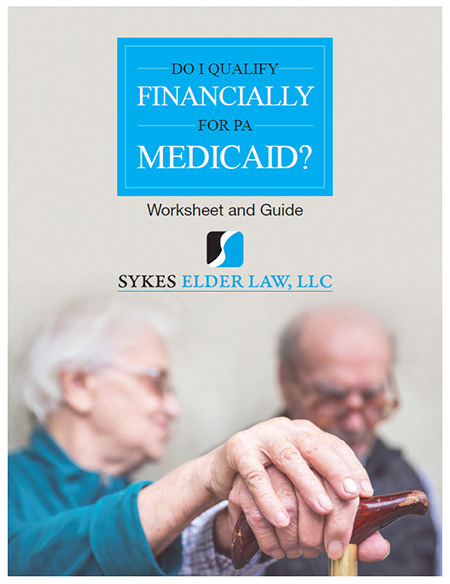This blog post is the sixth chapter of a series entitled “How to Qualify for Medicaid in Pennsylvania” that focuses specifically on when spend-down in necessary. Qualifying for Medicaid can be confusing and complicated, but this guide explains it in plain English. If you would like to order a copy of the complete guide click here.
NOTE: The Medicaid numbers used in this post are those in effect in February of 2022.
Sometimes, the amount of available, countable assets falls below the applicable limits as soon as the applicant is admitted to a facility.
Here are three examples. For each one, assume that the applicant meets the other eligibility requirements of citizenship, Pennsylvania residency, and medical eligibility.
Example #1 (single/widowed applicant): Nancy owns a house worth $300,000 that was her residence, and to which she would return if she were able. Her only other assets are a 2017 Toyota Prius worth $18,000, and a checking account worth $6,972. Nancy’s only income is her monthly Social Security payment of $2,081 (gross).
Nancy is already financially eligible for Medicaid. Her house and car are exempt assets. Her gross income of $2,081 is below $2,523, so her asset limit for countable assets is therefore $8,000. Because her only countable asset – the checking account – contains less than $8,000, Nancy qualifies for benefits with no spend-down needed.
Example #2 (married applicant): Richard owns a house worth $250,000 in joint name with June, the community spouse. June owns a car, and has $150,000 in her individual retirement account (IRA for short). The couple has checking and savings accounts, worth a total of $30,000. Richard receives $1,985 a month (gross) from Social Security, his only source of income.
Richard qualifies immediately for Medicaid. Richard’s asset limit is $8,000 because his gross income is below $2,523. The house and car are exempt assets, as is June’s IRA because she is a community spouse. Of their countable assets ($30,000), June can keep $27,480 as her community spouse resource allowance. That leaves $2,520, which is below Richard’s asset limit of $8,000.
Example #3 (married, low income): Martha, the community spouse, is entitled to a monthly maintenance needs allowance (MMNA) of $2,800 a month, but receives only $700 a month from Social Security. Curtis, the institutionalized spouse, has income only from Social Security. The amount of income, after allowable deductions, that Curtis has available to give to Martha is $1,100 a month.
Curtis and Martha have combined countable assets of $100,000. Martha may keep $50,000 as her CSRA and Curtis may keep $8,000. The couple therefore has excess assets in the amount of $42,000.
Because there is a gap between Martha’s MMNA and the amount of all available income, Martha may keep additional countable assets. (See the previous discussion of The Income Gap in the previous post on Spouse’s Income.) Let’s assume that Martha would be approved to keep additional assets in the amount of $54,000. Because that amount is more than the couple’s excess assets, they should apply immediately for Medicaid and seek legal counsel to assist them in calculating the amount of assets they can legally keep.
If you are already eligible for benefits, notify the nursing home immediately and make arrangements to file a Medicaid application as soon as possible.
This post is part of a series about “How to Qualify for Medicaid in Pennsylvania”
- Medicaid for Long Term Care
- Countable Assets
- Exempt (Non-Countable) Assets
- Asset Limit: Applicant & Spouse
- Spouse's Income
- When No Spend Down Is Necessary
- Gifting & the Medicaid Look Back Period
- How to "Spend Down" to Qualify
- Liability for Care Costs and Applicants' Children
- Medicaid Application Process
- What Happens After Medicaid/ Approval
- Medicaid Waiver Program
- Estate Recovery – What Happens After Death?
14. What is Medicaid Planning?






